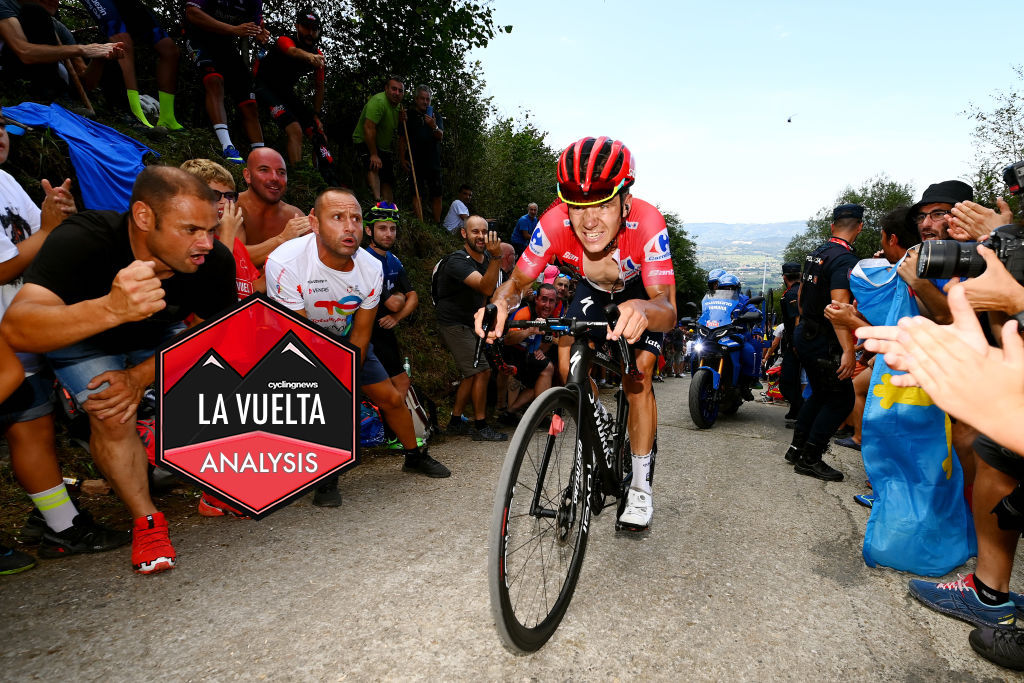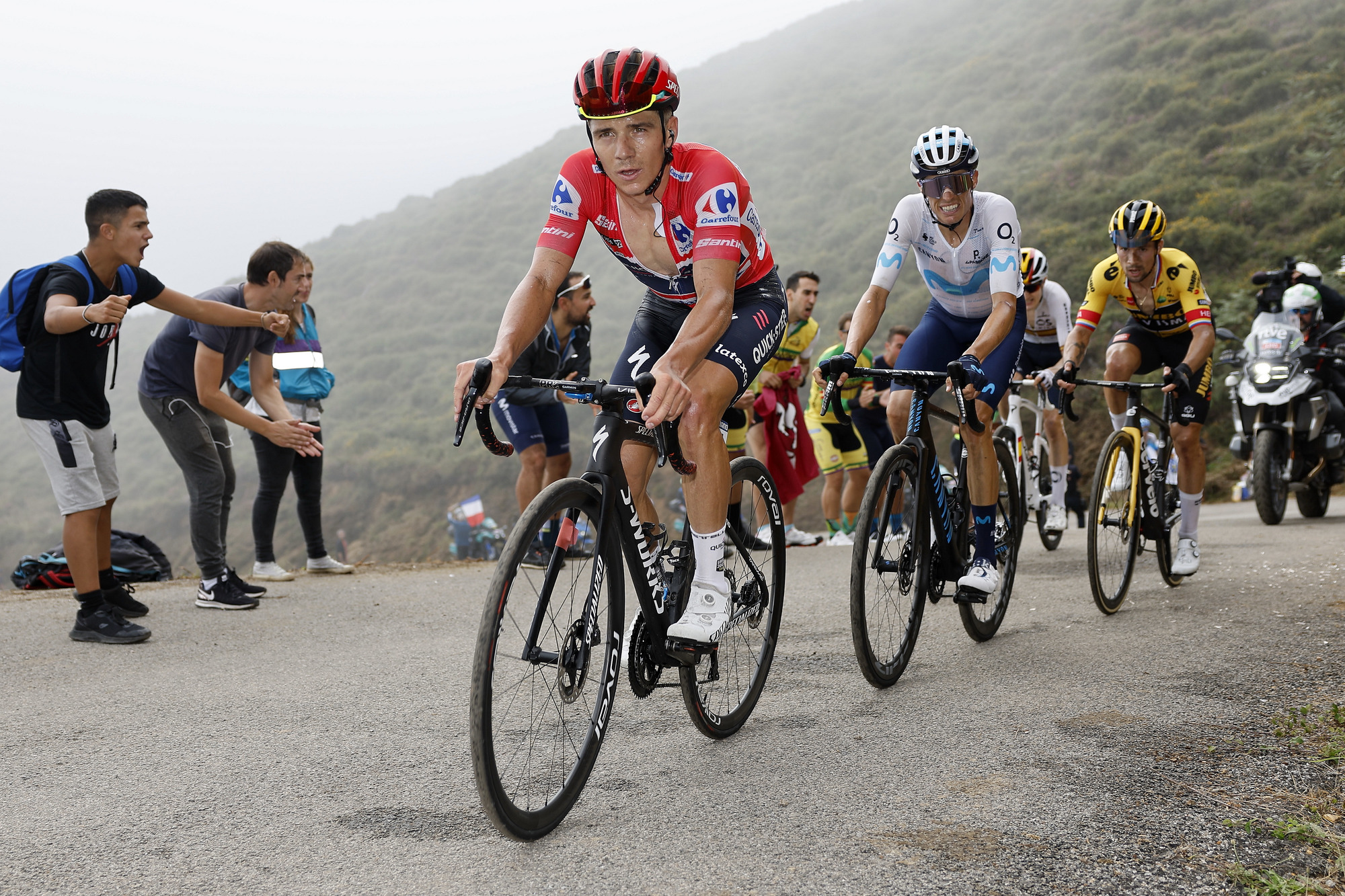'Wait until Sierra Nevada' – Vuelta is Evenepoel’s to lose but race still long
The lie of the land after Belgian’s dominant time trial win

Enric Mas glanced over his shoulder in the finishing straight and saw the train a-coming fast behind him. Last year in Santiago di Compostela, it was Primoz Roglič, but at least the race was already over. On Tuesday in Alicante, it was Remco Evenepoel, and there are still almost two weeks of the Vuelta a España to come. A daunting sentence.
Unlike on the final time trial of the 2021 Vuelta, Mas at least managed to fend off the chasing red jersey on stage 10 of this year’s race, but that was a scant consolation. He conceded just under two minutes to Evenepoel on Tuesday – 1:51, to be precise – and drops to third overall, 3:03 off the maillot rojo.
Afterwards, Mas dutifully trotted out the right lines about being satisfied at limiting his losses on unfavourable terrain, but the problem for him – and for everybody else – is that he has already shipped time to Evenepoel in the high mountains too. So far, the red jersey has betrayed no weaknesses. There are still eleven stages to go, but the Vuelta increasingly feels as though it is Evenpoel’s to lose.
Roglič, who restricted the damage to 48 seconds to move up to second overall, 2:41 behind Evenepoel, confessed that the Belgian is simply “on a different level” to everybody else. Asked if he now had to rely on Evenepoel enduring an unexpected crisis to win a fourth straight Vuelta, Roglič was typically vague – “We need to look day by day” – but he must know that the winning of the race is effectively out of his hands.
The deficits are forbidding for all the riders trailing Evenepoel, and things might yet get worse before they get any better. After leaving his rivals behind on the short but vertiginous slopes of Les Praeres on Sunday, Evenepoel could well do it all over again at Peñas Blancas on stage 12 if the mood strikes him.
“If Remco is riding the way he is, then he can ride away,” admitted Ben O’Connor (AG2R Citroën), 11th overall at 7:46, although Evenepoel himself hinted that he would adopt a more defensive posture for the remainder of the Vuelta. In footballing terms, Evenepoel has built up a hefty advantage in the first half and he can afford to park the bus in the second, even if his default setting is to attack.
Week two

The sparkling form of Evenepoel has been paired agreeably with the solidity of his QuickStep-AlphaVinyl squad through the first ten days of the Vuelta. In recent seasons, Patrick Lefevere has gradually been assembling a climbing core around Evenepoel, with Ilan Van Wilder, Louis Vervaeke and Fausto Masnada joining world champion Julian Alaphilippe and the evergreen Dries Devenyns by his side here.
Get The Leadout Newsletter
The latest race content, interviews, features, reviews and expert buying guides, direct to your inbox!
They have coped well with defending the maillot rojo to this point, despite losing Pieter Serry to COVID-19, and, just as importantly, few teams have the collective strength to trouble them here. Roglič, for instance, is without Sepp Kuss, who abandoned through illness, and though Ineos have considerable depth with Pavel Sivakov, Tao Geoghegan Hart and Richard Carapaz, their best-placed rider Carlos Rodriguez is even younger and more callow than Evenepoel – not to mention almost five minutes down on GC.
Mas, second overall in 2018 and 2021, has spoken romantically of taking an all or nothing approach to this Vuelta, but the mundane realities of his Movistar squad’s battle for WorldTour survival might take precedence over any inclinations towards a grand gesture, particularly as Madrid draws nearer and the need for UCI points becomes greater.
Further down the standings, Simon Yates (BikeExchange-Jayco) produced a solid time trial to finish within a minute of Roglič, but he still conceded some 1:42 to Evenepoel. Although he moved up to fifth overall, his 4:50 deficit means a podium finish is surely his glass ceiling now.
And yet, and yet. A Grand Tour, as Yates knows all too well, is a test of endurance. Evenepoel has hit all the right notes so far, but he must still hold a tune all the way to Madrid to secure overall victory. He is, by some distance and on all terrains, the strongest rider in this Vuelta, but he has never finished a three-week race before, and there are still many variables that can sprout up and disrupt the current narrative.
Beyond the obvious occupational hazards such as illness or injury, the soaring temperatures expected in the second week of the race will exact a toll on the entire peloton. “It’s filthy out there, it’s like being in a rainforest,” O’Connor said of conditions on the Costa Blanca on Tuesday, and they won’t be any less oppressive in Andalusia in the days ahead. “I hope it will be cooler in the next few stages, but I know it won’t be.”
Above all, there is a unique test awaiting at the end of the week. Evenepoel has already shown forcefully that he can cope with climbs equivalent to Peñas Blancas, the finale to stage 12, or La Pandera, which comes two days later. Stage 15, however, features the only special category ascent of the Vuelta, the mammoth haul up Sierra Nevada. The ascent is 19.4km in length with an average gradient of 7.9%, while the finish line is perched at some 2,501 metres above sea level.
Evenepoel, clearly, is the overwhelming favourite, and Roglič, by dint of his position and his pedigree, his most obvious challenger, but O’Connor cautioned against making any firm predictions until the Vuelta has climbed to its highest point next Sunday afternoon.
“I think wait until Sierra Nevada, it’s one of the hardest climbs I’ve done,” O’Connor said. “I think wait until then.”

Barry Ryan was Head of Features at Cyclingnews. He has covered professional cycling since 2010, reporting from the Tour de France, Giro d’Italia and events from Argentina to Japan. His writing has appeared in The Independent, Procycling and Cycling Plus. He is the author of The Ascent: Sean Kelly, Stephen Roche and the Rise of Irish Cycling’s Golden Generation, published by Gill Books.